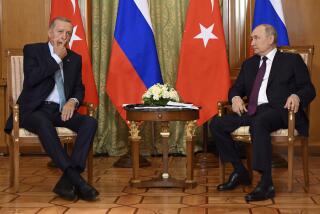Soviets Cool to U.S. Cut-Rate Grain Offer
- Share via
WASHINGTON — The Reagan Administration has sweetened its controversial offer to sell wheat to the Soviet Union at subsidized rates, but Moscow apparently is showing little interest in cutting a deal.
After U.S. wheat prices increased in August, making the grain less competitive on the world market, the Administration last week increased the bonus that it is offering the Soviets to $15 from $13 per metric ton. A metric ton is equal to 2,204.6 pounds.
The subsidized-sale decision--controversial here and abroad since its announcement last month--showed growing signs on Wednesday of backfiring politically for the White House as a key Republican senator renewed his criticism.
Sen. Richard Lugar (R-Ind.), chairman of the Foreign Relations Committee, said he thought that the Soviets’ refusal to buy had become embarrassing to the Administration and that the increased subsidy “demeans the process further.”
President Reagan, under intense pressure from Senate Majority Leader Bob Dole (R-Kan.) and other congressional Republicans, rejected the advice of senior Administration officials and approved the subsidy plan as a way of helping economically troubled U.S. farmers sell more surplus wheat.
Lugar, who after the initial announcement of the plan had charged that the subsidy scheme was intended to bolster GOP election fortunes in the wheat states, repeated his criticism Tuesday.
“I did not think it was a good idea. . . . I think it is even more embarrassing in the fact that we put the offer on the table a month ago and the Soviets have ignored it,” Lugar said.
Trade sources continued to express surprise that the Soviets have not accepted the U.S. offer, which is good until Oct. 1, when the third year of a five-year grain trading agreement with Moscow expires. The Soviets are committed under the pact to buy 4 million metric tons of wheat annually, a goal that they missed last year and are far from meeting this year.
“Everyone thought the Agriculture Department must have had some kind of commitment from the Soviets before the subsidy announcement was made,” one trade source said. “Otherwise, if they don’t sell the grain, it creates intense political pressure on the Republicans just a month before the election.”
Despite the increased subsidy, trade analysts noted Wednesday, other factors may be influencing the Soviets’ reluctance to buy U.S. wheat at the lower price offered by Reagan.
They said a key factor affecting the United States, as well as other grain exporters, is a set of stricter sales rules announced by the Soviets in July. One change would allow the Soviets to reject any grain shipment at the point of delivery without review of the grain’s quality by an independent inspector.
Analysts said major export firms are conducting talks with the main Soviet trading agency in an effort to clarify the rules.
More to Read
Sign up for Essential California
The most important California stories and recommendations in your inbox every morning.
You may occasionally receive promotional content from the Los Angeles Times.













